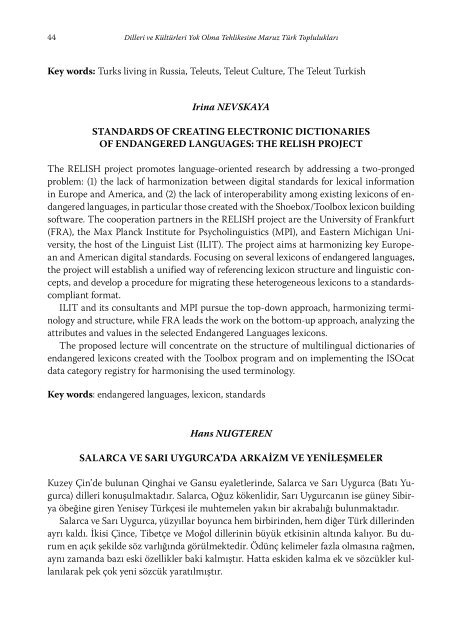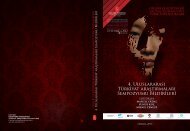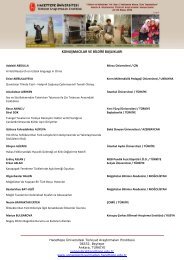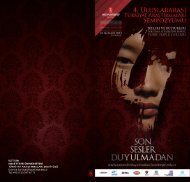bildiri özetleri - Dilleri ve Kültürleri Yok Olma Tehlikesine Maruz Türk ...
bildiri özetleri - Dilleri ve Kültürleri Yok Olma Tehlikesine Maruz Türk ...
bildiri özetleri - Dilleri ve Kültürleri Yok Olma Tehlikesine Maruz Türk ...
You also want an ePaper? Increase the reach of your titles
YUMPU automatically turns print PDFs into web optimized ePapers that Google loves.
44 <strong>Dilleri</strong> <strong>ve</strong> Kültürleri <strong>Yok</strong> <strong>Olma</strong> <strong>Tehlikesine</strong> <strong>Maruz</strong> Türk Toplulukları<br />
Key words: Turks living in Russia, Teleuts, Teleut Culture, The Teleut Turkish<br />
Irina NEVSKAYA<br />
STANDARDS OF CREATING ELECTRONIC DICTIONARIES<br />
OF ENDANGERED LANGUAGES: THE RELISH PROJECT<br />
The RELISH project promotes language-oriented research by addressing a two-pronged<br />
problem: (1) the lack of harmonization between digital standards for lexical information<br />
in Europe and America, and (2) the lack of interoperability among existing lexicons of endangered<br />
languages, in particular those created with the Shoebox/Toolbox lexicon building<br />
software. The cooperation partners in the RELISH project are the Uni<strong>ve</strong>rsity of Frankfurt<br />
(FRA), the Max Planck Institute for Psycholinguistics (MPI), and Eastern Michigan Uni<strong>ve</strong>rsity,<br />
the host of the Linguist List (ILIT). The project aims at harmonizing key European<br />
and American digital standards. Focusing on se<strong>ve</strong>ral lexicons of endangered languages,<br />
the project will establish a unified way of referencing lexicon structure and linguistic concepts,<br />
and de<strong>ve</strong>lop a procedure for migrating these heterogeneous lexicons to a standardscompliant<br />
format.<br />
ILIT and its consultants and MPI pursue the top-down approach, harmonizing terminology<br />
and structure, while FRA leads the work on the bottom-up approach, analyzing the<br />
attributes and values in the selected Endangered Languages lexicons.<br />
The proposed lecture will concentrate on the structure of multilingual dictionaries of<br />
endangered lexicons created with the Toolbox program and on implementing the ISOcat<br />
data category registry for harmonising the used terminology.<br />
Key words: endangered languages, lexicon, standards<br />
Hans NUGTEREN<br />
SALARCA VE SARI UYGURCA’DA ARKAİZM VE YENİLEŞMELER<br />
Kuzey Çin’de bulunan Qinghai <strong>ve</strong> Gansu eyaletlerinde, Salarca <strong>ve</strong> Sarı Uygurca (Batı Yugurca)<br />
dilleri konuşulmaktadır. Salarca, Oğuz kökenlidir, Sarı Uygurcanın ise güney Sibirya<br />
öbeğine giren Yenisey Türkçesi ile muhtemelen yakın bir akrabalığı bulunmaktadır.<br />
Salarca <strong>ve</strong> Sarı Uygurca, yüzyıllar boyunca hem birbirinden, hem diğer Türk dillerinden<br />
ayrı kaldı. İkisi Çince, Tibetçe <strong>ve</strong> Moğol dillerinin büyük etkisinin altında kalıyor. Bu durum<br />
en açık şekilde söz varlığında görülmektedir. Ödünç kelimeler fazla olmasına rağmen,<br />
aynı zamanda bazı eski özellikler baki kalmıştır. Hatta eskiden kalma ek <strong>ve</strong> sözcükler kullanılarak<br />
pek çok yeni sözcük yaratılmıştır.





